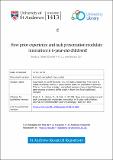Prior experience mediates the usage of food items as tools in great apes (Pan paniscus, Pan troglodytes, Gorilla gorilla, and Pongo abelii)
Abstract
Humans use tools with specific functions to solve tasks more efficiently. However, functional specialization often comes at a cost: It can hinder the production of actions that are not usually performed with those tools, thus resulting in a fixation effect (functional fixedness). Little is known about whether our closest living relatives, the nonhuman great apes, are vulnerable to this detrimental effect of experience. We examined whether great apes from 4 species (N = 35) would become fixated on the familiar action with an object. More precisely, some subjects experienced a novel food item (grissini), either whole or broken into pieces, whereas others did not. Then, subjects faced a task that required them to use the food item to rake in an out-of-reach food reward. Results indicated that all 4 species could use a food item as a tool. Apes were more likely to do so in the first trial when they had not experienced the tool as food before, even though they tasted the food before using it as a tool. Orangutans and bonobos used the food item more often as a tool than chimpanzees. A preference test ruled out that performance was dependent on individual or species food preferences. Our results suggest that apes might have represented one object in two different ways (i.e., as "food" and as "tool") and then became fixated on one of these two representations. However, it is unclear whether the fixation occurred because of the item's prior function or its identity.
Citation
Ebel , S J , Völter , C J & Call , J 2021 , ' Prior experience mediates the usage of food items as tools in great apes ( Pan paniscus , Pan troglodytes , Gorilla gorilla , and Pongo abelii ) ' , Journal of Comparative Psychology , vol. 135 , no. 1 , pp. 64-73 . https://doi.org/10.1037/com0000236
Publication
Journal of Comparative Psychology
Status
Peer reviewed
ISSN
0735-7036Type
Journal article
Collections
Items in the St Andrews Research Repository are protected by copyright, with all rights reserved, unless otherwise indicated.

